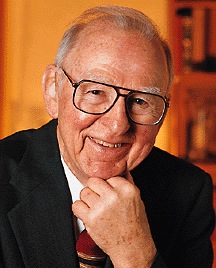Edwin G. Krebs
Edwin Gerhard Krebs (June 6, 1918 – December 21, 2009) was an American biochemist renowned for his research on protein phosphorylation as a mechanism to regulate cellular processes. His groundbreaking work, conducted alongside Edmond H. Fischer, on the reversible phosphorylation of proteins laid the foundation for understanding the control of numerous cellular activities. This discovery was pivotal in the field of cell biology and earned Krebs and Fischer the Nobel Prize in Physiology or Medicine in 1992.
Early Life and Education[edit | edit source]
Edwin G. Krebs was born in Lansing, Iowa, and grew up in Urbana, Illinois. He pursued his undergraduate studies at the University of Illinois at Urbana–Champaign, where he developed an interest in chemistry and medicine. After receiving his B.S. in Chemistry in 1940, Krebs enrolled at the Washington University School of Medicine in St. Louis, where he earned his M.D. in 1943. His medical training coincided with World War II, leading him to serve in the United States Navy as a medical officer upon graduation.
Career and Research[edit | edit source]
After the war, Krebs returned to academia, joining the faculty at the University of Washington in 1948. It was here, in the early 1950s, that he began his collaboration with Edmond H. Fischer. Together, they discovered that the enzyme phosphorylase, which plays a critical role in the metabolic process of glycogen breakdown, could be activated and deactivated by the addition and removal of phosphate groups. This reversible process, known as phosphorylation and dephosphorylation, was revolutionary in its implication that enzymes could be regulated through chemical modification.
Their work opened up new avenues for research into the regulation of biological processes and has had profound implications for the understanding of diseases such as cancer, diabetes, and Alzheimer's disease. The significance of their discovery was recognized with the awarding of the Nobel Prize in 1992, highlighting the impact of their research on the field of molecular biology.
Later Years and Legacy[edit | edit source]
Krebs continued his research and teaching career beyond the Nobel Prize, serving in various academic positions and contributing to the scientific community until his retirement. He was a member of several prestigious organizations, including the National Academy of Sciences and the American Academy of Arts and Sciences.
Edwin G. Krebs passed away on December 21, 2009, leaving behind a legacy that transformed our understanding of cellular regulation. His work continues to influence the fields of biochemistry and molecular biology, with ongoing research building upon the foundation he helped establish.
Awards and Honors[edit | edit source]
Throughout his career, Krebs received numerous awards and honors in addition to the Nobel Prize. These include the Albert Lasker Award for Basic Medical Research and the Gairdner Foundation International Award, recognizing his contributions to science and medicine.
See Also[edit | edit source]
Translate: - East Asian
中文,
日本,
한국어,
South Asian
हिन्दी,
தமிழ்,
తెలుగు,
Urdu,
ಕನ್ನಡ,
Southeast Asian
Indonesian,
Vietnamese,
Thai,
မြန်မာဘာသာ,
বাংলা
European
español,
Deutsch,
français,
Greek,
português do Brasil,
polski,
română,
русский,
Nederlands,
norsk,
svenska,
suomi,
Italian
Middle Eastern & African
عربى,
Turkish,
Persian,
Hebrew,
Afrikaans,
isiZulu,
Kiswahili,
Other
Bulgarian,
Hungarian,
Czech,
Swedish,
മലയാളം,
मराठी,
ਪੰਜਾਬੀ,
ગુજરાતી,
Portuguese,
Ukrainian
Navigation: Wellness - Encyclopedia - Health topics - Disease Index - Drugs - World Directory - Gray's Anatomy - Keto diet - Recipes
Search WikiMD
Ad.Tired of being Overweight? Try W8MD's physician weight loss program.
Semaglutide (Ozempic / Wegovy and Tirzepatide (Mounjaro) available.
Advertise on WikiMD
WikiMD is not a substitute for professional medical advice. See full disclaimer.
Credits:Most images are courtesy of Wikimedia commons, and templates Wikipedia, licensed under CC BY SA or similar.
Contributors: Prab R. Tumpati, MD

